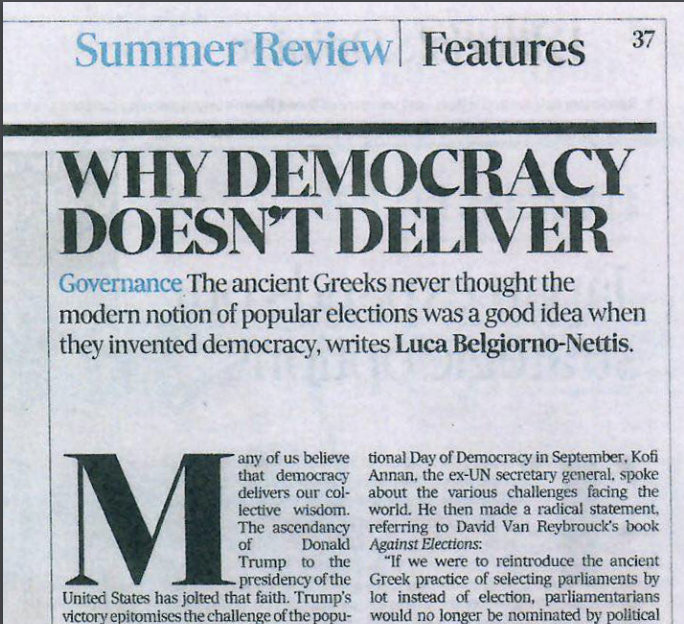Many of us believe that democracy delivers our collective wisdom. The ascendancy of Donald Trump to the Presidency of the United States has jolted that faith. Trump’s victory epitomises the challenge of the popular vote. Elections are synonymous with democracy, but it is disconcerting to see how poorly that tool is serving us now. The elected politician is no longer respected, no matter the country or mandate. In any number of surveys, politicians consistently rank with car salesmen. Nurses and doctors remain the most admired. In the bastions of Western democracy – the US, Britain, France and Germany – the winning candidate can hardly muster 30 per cent primary support. The least disliked contender is decreed triumphant.
Indeed, it can be argued that elections do more harm than good. They’re supposed to bequeath us with our worthiest, in a transparent tournament. But elections entangle two things best separated: candidates and policies. Elections conflate personal ambitions for power, with public policy development. Point-scoring is the preferred tool of the trade, as candidates seek to demarcate themselves, one from the other. Populism and sloganeering become the handmaidens. Elections rally the emotional energies of the crowd, rather than entreating to their wisdom. Puerile debate reigns over thoughtful deliberation, poisoning civil dialogue. The relentless scramble for newsworthiness exacerbates the Punch and Judy show.
Then there’s the politicisation of the public service, and the vested interests related to campaign funding. The US is especially notorious for the latter, as well as the redrawing of electoral boundaries – the entrenched gerrymander carried Trump. Good government suffers all the while. Elections have a lot to answer for.
Voters may be exasperated by democracy’s shortcomings, but people endure – blind to any alternatives. Liberal democracy is the worst system of government, Churchill famously quipped, except for all the others that have been tried before. Wedded to the popular vote as the incontrovertible template – regardless of how unrepresentative the results and unloved the politicians – the constituent is captive. It’s a form of electoral fundamentalism, whereby the vote remains the singular most cherished, inalienable right.
Random recruitment
On the International Day of Democracy in September last year, Kofi Annan, the ex-UN secretary general, spoke about the various challenges facing the world: the growing inequalities between the rich and poor; how nation states appear powerless in the face of global forces; and how the young feel disillusioned with political institutions. He then made a radical statement, referring to David Van Reybrouck’s book Against Elections:
“If we were to reintroduce the ancient Greek practice of selecting parliaments by lot instead of election, parliamentarians would no longer be nominated by political parties, but chosen at random for a limited term, in the way many jury systems work. This would prevent the formation of self-serving and self-perpetuating political classes disconnected from their electorates.”
You may think that when the Greeks invented democracy they had elections in mind, but they didn’t. Most people know that the Greeks – in the 5th century BC – excluded women and slaves from public life. So did every other polity – 2000 years later. The distinctive genius of what is possibly the most important human invention, is that it was based on random recruitment – not elections – and included poor men. Yes, that’s right. Democracy was devised to be truly representative, with no need for popular elections. The poor were automatically represented. Random recruitment had no need for a bloody struggle for the franchise; it was quintessentially inclusive and deliberative, from the get-go.
Selection-by-lot is still used today in criminal juries, but the practice is generally regarded as inappropriate for parliamentary service. “Everyday people are not competent” is the standard refrain. However, when citizen juries are given complex public policy issues, the results are persuasive.
In 2012, Ireland held a Constitutional Convention, made up of 99 delegates, 66 of whom were randomly recruited. The process is being regularly used now in Ireland to deal with difficult questions. Last year, a citizen jury studied abortion reform – and then drafted a set of recommendations for a referendum. At the end of 2016, Australia concluded its biggest ever public deliberation. A jury of South Australians decided not to proceed with a high-level nuclear waste facility. In every jury, the citizens are randomly recruited from the electoral rolls, and then this “mini-public” is cross checked to match the wider community in terms of gender, age, and income. The jurors are paid a per-diem, and they spend about 50 hours in face-to-face meetings, over several days, across two or more months. They discuss in plenary sessions and at tables of six to 10 each, with good facilitators. They get to hear from all the various interested parties, face-to-face and online.
Political systems outmoded
Replacing Parliament with everyday citizens might sound like a crackpot proposition but many countries, not just Australia, think their political systems are outmoded. Imagine how refreshing it would be to watch a Citizens’ Senate acting out of a genuine desire to develop good policy, rather than playing politics.
The role of a such a body could begin as a modest one by helping to resolve, as in Ireland, contentious issues (such as Section 44, or the Republic, or Australia Day). The next step might give the body the power to draft, revise or review bills, and then perhaps a vote on key legislation and budgets. This could lead to a fully-fledged Citizens’ Senate to replace an Upper House.
Public decision-making is about considered dialogue and consensus building, not trenchant debates and point-scoring. There’s no need for dramatic spokesmen or empty rhetoric. It may be a step too far to dispense with elections altogether – for now – but we could at least start to salvage our collective wisdom, by admitting to the failings of the popular vote.
Luca Belgiorno-Nettis is the founder and a director of the newDemocracy Foundation
AFR Contributor
As published on the Australian Financial Review. 22 January 2018





